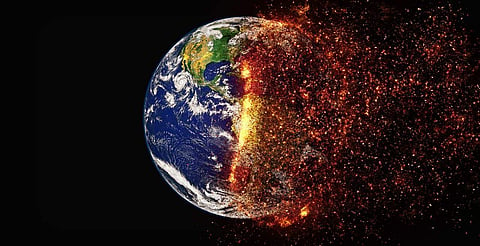

Climate and climate change need to be in every school textbook, said teacher, educator and writer Christopher Graham, speaking at The Climate Connection: Conversation for Change organised by the British Council on June 3. The panel was discussing the role of arts, culture, individuals and what the policymakers can do to help propagate the climate issues.
"Based on my research, there is a huge desire around the world to integrate climate issues into their classrooms. The challenge is that they don't know how to. One is to have better teacher education and training and making sure they have the resources too. This can be done with two approaches. One can be bottom-up, where we encourage schools to develop resources. But I think the most important is top-down — from the ministerial level and it's happening now around the world, said Graham. "In China, it is compulsory now to have climate issues in English language education. Their storybooks in preliminary levels, with very strong graphics, are around climate issues. Climate has to be in every curriculum area," he added.
The youth have been changing the dynamics of the climate change dialogue for the past few years. "Young people have really moved the dial on climate change over the last two or three years. We have young people from across the world who have been protesting. there are six young people in the European Union who are taking 33 governments to court and have been invited to do so by the European Court of Human Rights. They are also terrific problem solvers. So, we should take a step back and listen to what they are saying. We need to listen, heed and use anything in our power to make way for their ideas," said Alison Tickell, the founder of Julie’s Bicycle, an organisation trying to connect sustainability to arts and culture.
But just advocating change to save the climate is not enough. One needs to keep the economy in mind as well for it to be a sustainable step to save the climate, said Ahmed Yassin, the co-founder of Banlastics Youth Initiative in Egypt, advocating environmental values and awareness around the use of plastic in Alexandria. "One of the drawbacks that stop us from advocating for the climate is the excuse that the economy will be affected — it's not easy to adapt, phase out. We are trying to make the economy a part of our dialogue as wee. We are connecting with decision-makers to support us with laws. but we need to push more as we are in the countdown now — climate change is a climate emergency now," he added.
Climate change has become a climate emergency now, said green advocate Ahmed. Plastic is one of the major pollution issues developing countries face. "I am from Alexandria and being a Mediterranean coastal city we are infested with plastic floating around on our beaches and our waters. Everybody is trying to find out a solution but they don't understand how it started. The problem is that there are no proper rules to relate the plastic industry. it is one of the most flourishing and booming industry. The emissions are also increasing as the industrial cities expand and come closer to the residential areas and these emissions, mostly carbon monoxide, is a major part of our atmosphere now," added Ahmed. He also said the oil rigging in the desert has caused widespread climate issues but people have realised the problems and are working towards mitigating them now that they are threatened to be under the sea in the next 50 years.
Can arts and culture drive the climate change dialogue? Alison said, "It is really about how arts and culture can reframe this plethora of interconnected issues. Plastic is very deeply connected to everything else. We have to rethink the narrative and cultivate the values that sit underneath it." Talking about their initiatives over the past 13 years, Alison said that every vertical of art and culture has the potential to reduce pollution right from the audiences travelling to the concerts to the artists themselves and people are longing to take action.
"Climate change is not a linear concept and neither does it affect everyone similarly. And the best way to engage audiences s through culture. If you can explain climate change and its impact through art, music, language, instead of jargons, it would be a great way of making action on climate the norm," said Rishika Das Roy, a British Council Future Leaders Connect alumna and current Technical Policy Consultant at Oxford Policy Management, based in India.
But along with the lawmakers taking up the issue seriously, we also need people to be sensitised about the issues. "In real life, the consumers have the power of money. If they don't want to put their money into a product which doesn't have ethical supply chains or don't take a stand on emissions, it can and it will change businesses," said Rishika. But the policymakers can help too. "There are a bunch of things that the policymakers can do and a lot of that will have to shift consumption patterns. There is also the behaviour change that comes from the civil society and trickles down the population," she added.
